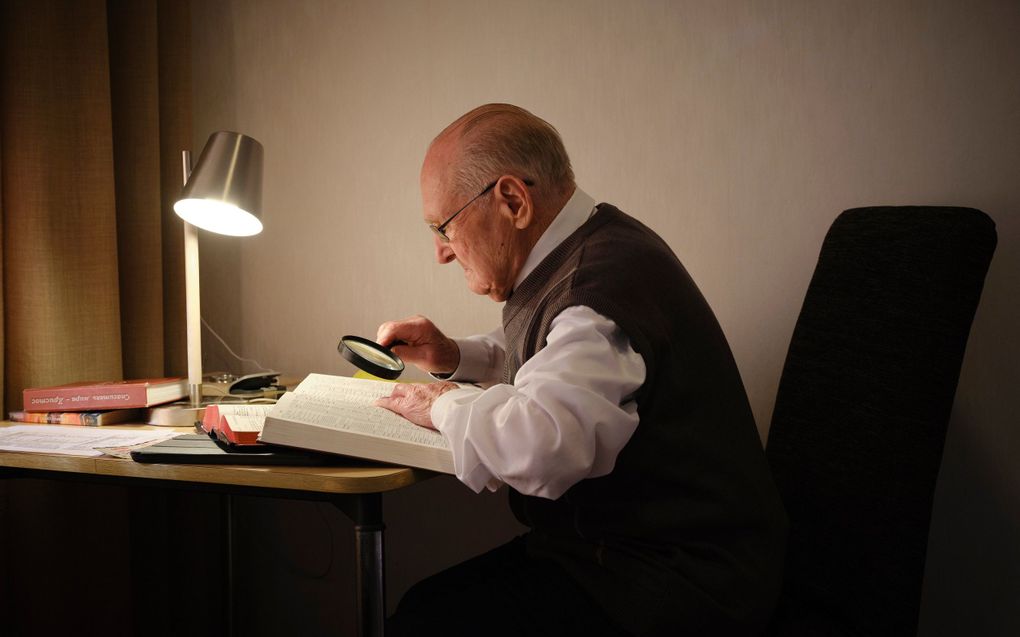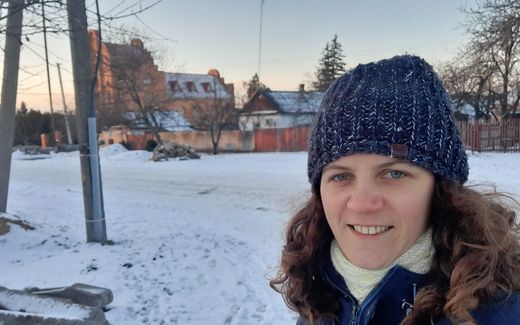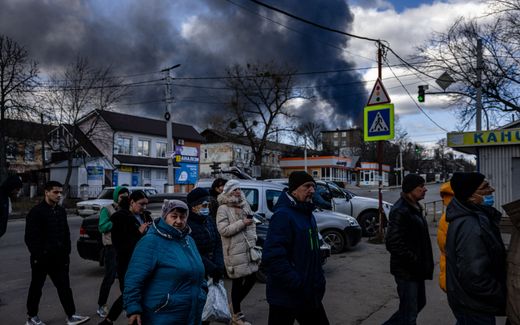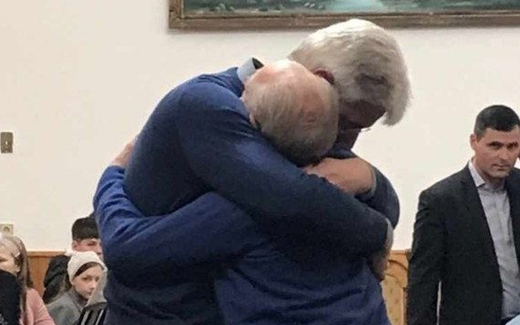Ukrainian pastor believes in greater end than peace on earth
21-05-2022
Christian Life
Clasina van den Heuvel, RD

Pastor Vinogradsky. Photo Sjaak Verboom
Christian Life
He hopes to celebrate his 92nd birthday in Zjitomir, Ukraine. He was not planning to flee but did it anyways, immediately after the Russian invasion. That is why pastor Daniil Michalovitz Vinogradsky has been in the Netherlands since early March. Unexpected turns or seeming contradictions in life do not surprise him anymore. His life has been full of them.
On the day of the Russian invasion of Ukraine, the Vinogradsky family travelled in three cars from Zhitomir to the Netherlands. Pastor D.M. Vinogradsky was part of the group. Two of his daughters have been living in the Netherlands. One of them is Katja Ploeg-Vinogradskaya. She married Cor Ploeg, a musician, and lives in Genemuiden. One Monday morning in April, Pastor Vinogradsky is at her house, patiently waiting for an interview, even though he has given more of them recently. He speaks Russian, and Katja translates.
Rev Daniil Michalovitz Vinogradsky

Daniil Michalovitz Vinogradsky (1930) was born in a Christian family in Zhitomir. When he was 16 years old, he "deeply doubted the existence of God." That changed when he received a book about evil in the world. At the age of 20, he was baptised; when he was 34 years old, he was installed as pastor in his hometown. During the Soviet period, he stayed in prison twice because of his faith. After the fall of the Iron curtain, his congregation in Zhitomir was free to gather. In addition, the Christian school he founded with the support of Driestar College now counts about 350 students. In the meantime, he put effort into establishing a preschool.
In 1957, he married Raïsa Ivanovna Linik-Vinogradskaya, who passed away in 2007. The couple received nine children, of whom three passed away.
He looks a bit tired, somewhat absent. Usually, he meditates in the morning, between 8 a.m. and 12 a.m. That provides him with words for the daily meditations he sends around via e-mail and WhatsApp since the start of the Covid pandemic. But as soon as we touch on the topics of theology and the world, he straightens right away. "When I think, I live", he says.
Did you write a meditation early this morning already?
Katja translates the question and then replies: "He says: "You have to explain that I always ask everyone not to disturb me in the morning!" But that warning is more for me because I could not come for the interview this afternoon. I said to him: "If you want me to translate, you have to plan the interview in the morning. The morning is holy for him, so it is exceptional that he is here."
He wrote his meditation yesterday already, pastor Vinogradsky says. "I have been meditating all my life; the difference between now and then is that I write down my meditations. I intend to do so as long as my mind lets me and as long as I live.
When it was my 90th birthday, I was enticed by technology. I received a tablet, and my son-in-law taught me in the summer holiday how to use it. I cannot say that I desired to learn these digital skills, but it has been the guidance of God. And now they have put me in church again every Sunday. But no: I feel that this is God's plan. When the Lord gives me such clarity of mind, I must preach."
Every Sunday, pastor Vinogradsky leads Ukrainian church services in Kampen.
And you are 91 years old
"Almost 92. It is possible that I have to celebrate my 92nd birthday here, but I would rather do so in Zhitomir."
Do you feel at home here?
"Yes, I do feel at home. We have had contact with Dutch churches for more than 30 years already. By the way, I was not planning to leave Ukraine. But six of our families could cross the border because they have three or more children under 18. Thus, I went along. On February 24, my children gathered immediately to decide what we should do. There is a military airbase in Zhitomir, which was bombed right on the first day, at 5 a.m. I did not hear it. When I woke up at 8 a.m., my children said: "The war has begun, and I did not believe it.
We have a large family. Including grand- and grand grandchildren, it consists of 75 people. Part of the men is still in Ukraine, and part of the families is there. Thus, we have many relatives and many acquaintances in Ukraine. If we are worried about them? Yes, we are."
You are involved with a Christian school in Zhitomir. Is the building still there?
"Yes, the school is located in the city centre. There are no military targets there. But the same applied to another school in Zhitomir, which was bombed anyway..."
You experienced the regime of Joseph Stalin, after that the one of Khrushchev, and then of Brezhnev. In the 80s, Gorbachev came to power. Then the Soviet Union collapsed, and the Protestant churches received freedom. That was a significant change. Are you afraid that this freedom will disappear again?
"The Communist ideology, including its atheism, has been destroyed, eradicated. The current conflict does have an ideological drive. It is a political conflict between Moscow and the West, between totalitarianism and democracy.
What worries me is that Putin has the idea that he is the instrument of God. Because Patriarch Kirill blessed him. Putin sees it as his mission to restore the Soviet Union. He adds a bit of religion to his worldview as if he is striving after religious goals. He presents himself as a spiritual person and calls the West godless. The Church in Moscow even has an icon of him. He has not been canonised, but still, there is an icon of him.
Up till now, Putin has not taken action against traditional denominations, such as Orthodox congregations, Roman Catholics or Protestants. He does take action against sects, such as the Jehovah's Witnesses. Currently, I do not see any atheist characteristics like those we had to deal with in the past.
What happens now is more comparable to the time of the Tsars. The Orthodox Church was then the state church; protestants, like the Baptists, were seen as a sect. Now, that has changed. However, what grieves me is that only a few Baptists speak out against the war; the rest keeps silent. I am afraid that many of them believe Putin because he crosses his fingers and goes to church.
By the way, when we speak about Gorbachev, his "baboesjka", his grandma, was a Baptist."
You have experienced persecution and afterwards freedom, two extremes for the church. Putin calls the Western norms despicable. How do you look at this?
"Of course, it was good to have the freedom to preach to Gospel. It is good that our church grew from 20 members to 300 members. But freedom also has another side: spiritual weakening. The attractiveness of the world has become larger. A danger of the propaganda of tolerance is that sin is no longer called sin. In fact, sin has been legalised. Also, Ukraine allowed gay prides to be organised. We do not have to imprison people who join, we should not humiliate them or take their freedom, but we do have to point out what is sinful."
Are you surprised by this war?
"Njet. No, I am not surprised. Conflicts are becoming worse and break out more often. I do not say that it will be tomorrow or the day after – maybe it will take thousands of years – but the end of the world is to come. People will fight; everything is focused on their ego. They want to get their right. Ultimately, this conflict is not about Russia against Ukraine; it is about the power in the world, about the one people that stands up against the other. And it all happens because of the one catastrophe in the Garden of Eden.
The fall into sin was a catastrophe. Man was created for eternal life. But now everyone knows that everyone will die sometime."
Mr Vinogradksy speaks fervently. Katja barely has time to translate. "It will never be different here. We live in a world where conflicts become fiercer, heavier, and crueller. Only in the new heaven and on the new earth the world will be completely different. There, wars will never break out, and people will never die again. Everything will be as it was meant to be from the beginning, with one exception: in the Garden of Eden, there was the tree of good and evil. But in the new paradise, there will only be the tree of the good, not of the evil, because all evil has been eradicated then.
Every human being has been created with an inner realisation of good and evil. Jesus Christ showed very clearly during his ministry on earth what is good. And everyone who reads the Bible daily cannot but say that what Putin does is evil. The conflict between good and evil is clearly seen here."
After the Second World War, Europeans said: "Never war again"
Pastor Vinogradsky smiles pitifully. "You know what the Baptist minister Billy Graham said? We have to fight for peace, but there is a constant conflict. We can only pull the two apart – have peace talks, appease – and that leads to some peace."
At a conference of the organisation Help Zhitomir at the end of last year in Genemuiden, Mr Vinogradksy often flipped through the pages of his Bible before he answered. He did so because he wanted to find the passage he wanted to mention. Luke 20:25, 1 Peter 5:8. He knew precisely which chapter he needed to find.
Is that knowledge related to your time in prison when you read from the Bible often? That you always want to go back to the source before you say something?
He nods and then tells about how it was possible that he could read from the Bible in prison. "I had a job in prison. I was supposed to hand out tools. Thus, I had my own office that I could lock. I created a secret drawer for my Bible so that I could read from it every evening for two or three hours with the door locked.
I bribed a few people to get a Bible smuggled into prison. Here is a good example of good and evil: was it good to secretly arrange for a Bible to be brought into jail, or not? I paid bribes; is that sinful? Of course, that is not a sin. But the person who put me in prison could have said: this is wrong."
You said: "Now everyone knows that everyone will die sometime." You have experienced many deaths from close by – three children, your wife... Who reaches the age of 91 has seen many people pass away. How can a human being live with so many deaths around him?
Pastor Vinogradsky closes his eyes, smiles and puts his hands together. He sighs quietly, then keeps his hands folded into a bridge. "Man tries to imagine what death is", he says thinkingly. "During your life, you cannot imagine. But we should rather think about life. Life has no end. Everything that I touch that I see has an end." He taps on the table, then on his arm. "This too: our body." Then he puts his fist against his breastbone. "But what is inside, deep inside of me, my soul, is endless, eternal. There are temporary things. What is temporary is physical. But what is in us is immortal, eternal. And especially that belief in immortality, the eternal things, is life. Because of the resurrection of Christ, death does not frighten us anymore."
He speaks fervently, just like before. He asks for a "Bibliya" and looks for a chapter; mutters that he cannot find it because it is not his own Bible.
"What is the biggest fear of people? That is death. It is inevitable: everyone has to die. Everyone must pass through that. But after death, another life waits; that is my strong desire – the world where evil does no longer exist, where there are no tears, goodbyes or grief.
Man clamps to life on this earth; family, children, people around you. But higher goals weigh more than everything on this earth.
I understand that the words I speak are beautiful. And that it is difficult to reach this stage in life. Thirty, forty, or fifty years ago, I did not have the feeling I describe now. But since I am 90 plus, I truly experience it this way.
But what hits me is that some people of 90 years and older clamp to life so strongly. They do not want to go. I do not understand that. They are still afraid of death."
You smile because of that
Mr Vinogradsky nods.
And this faith has carried you through all your losses?
"I cannot say that I was not grieved. When I had to bury my son five and half years ago, I clamped to the coffin. But I am comforted by the thought that the Lord called him at the best moment. When someone is not afraid of death, that does not mean that that person is not sad or does not experience a loss."
You have 29 grandchildren, 17 grand grandchildren... What is your expectation for them, here or in Ukraine
"My only prayer for them is that the seeds that have been sown and planted – by us, through their parents – will bear good fruits. I am very thankful that all of them still go to church."
And you can let them go, release them?"
Pastor Vinogradsky nods slowly.
Katja: "We do not know the word "release" in Russian, so I translated that as "give it in God's hands"."
Vinogradsky: "That does not mean that a large family like mine does not experience trials or losses. But we have to keep our eye on our ultimate goal. That brings peace to our hearts. That is: Believe in a goal that goes beyond peace on earth."
Related Articles





